This week’s homework is Practice Makes Perfect.
Choose a poem. Copy it into your homework book. Try to read the poem every day to learn it by heart. If you want to, you will be able to perform your poem to the class.
Here are some ideas:



This week’s homework is Practice Makes Perfect.
Choose a poem. Copy it into your homework book. Try to read the poem every day to learn it by heart. If you want to, you will be able to perform your poem to the class.
Here are some ideas:



This week’s spellings are more common exception words (words that don’t follow the usual spelling rules). There are lots of ideas in our super spelling strategies to help you child learn them.
Year 1
Year 2
We have started a new history topic. Lots of our learning will be linked to The Great Fire of London. We are reading this book to support our learning:

You could search for a video of it on You Tube or there is a slideshow of the story here that you can read with your child at home.
We will be learning about where and how the fire started, why it ended up being so ‘great’ and what happened afterwards. We will also be learning about fire safety.
Help at home by asking your child about what they have learnt about The Great Fire of London so far.
Here is your home learning for this week with a welcome video from Mrs Latham.
Maths
This week’s maths learning is all about addition.
Year 2
You don’t have to print the worksheets. Your child can write or draw their answers on paper. Your child’s learning will be most effective if you sit with them to pause the clip and check / praise / support your child as the clip moves on.
(Suggested time: 30 minutes of Maths and 15 minutes of Rockstars daily)
Spelling
Look on the homework page to find this week’s spellings. Your child should complete one task each day.
(Suggested time: 15-20 minutes daily)
Reading fluency
This is the text we’re using in class this week to build up fluency skills.
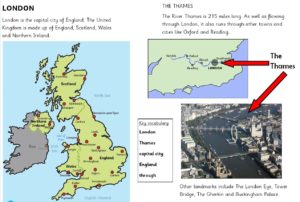
In school, we generally follow this sequence:
(Suggested time: 15 minutes daily)
Reading comprehension and phonics
Day 1: We’ll be using this ‘RIC’ text in class to practise comprehension skills.
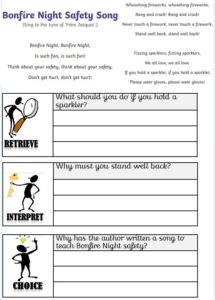
RIC stands for:
Day 2: Agree with your child three words from any text they’ve read which they’re less familiar with. Your child should find out what they mean (eg by checking an online dictionary or simply discuss with you) and how to use them in sentences (both when speaking and when writing). Challenge your child to write a sentence with each word in, or to drop the words into conversations at home.
Day 3: Watch the video lessons for phonics sounds for ‘ay’ and ‘a_e’ and ‘ea’, ‘e_e’ and ‘ey’.
Day 4: Go on a sound hunt around your house or look in books to find as many things as you can that contain the phonics sounds ‘ay’, ‘a_e’, ‘ea’, ‘e_e’ and ‘ey’. Write a list of all the things you find. Challenge : Write sentences containing some of the words.
Day 5: Book Club. Once a week, we have a relaxing lesson where we sit and read quietly, often with an adult. You can read the books you take home from school or some of your own books.
(Suggested time: 30 minutes daily)
Writing
Activity 1:
Year 2 children: Write three sentences about a picture or photograph you choose. Your child should remember capital letters, finger spaces, joining up letters if they can (use our handwriting guide to help), and a full stop, exclamation mark (!) or question mark (?) to end the sentence.
Activity 2:
Finger strengthening activities support the development of fine motor skills needed for writing.
Challenge your child to have a go at 3 or more of these activities: practise tying shoe laces, fasten and unfasten buttons, attach nuts and bolts, separate dried pasta and dried peas (or similar) into two separate piles, do some mindfulness colouring in, do a jigsaw, cut up drinking straws and thread them on to a shoe lace, attach clothes pegs (the squeezable type) to a shoe box or similar, use a paint brush and water to make pictures or words on a wall, chalk words or pictures on the ground, make a Lego model.
(Suggested time: 30 minutes daily)
Topic
Our current topic work is History – learning about the Great Fire of London. This week we are thinking about maps. Have a look at the maps and see what you can see that is the same and different on each map.
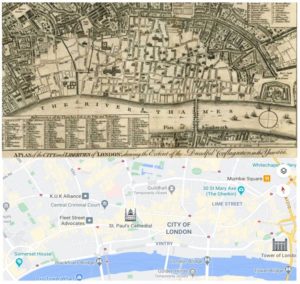
(Suggested time: 30 minutes)
Science
Our science work this week is about animals and their babies. Listen to the song about baby animals. Challenge : Draw and label some adult animals and their babies.
(Suggested time: 30-45 minutes)
Here is your home learning for this week with a welcome video from Mrs Latham.
Maths
This week’s maths learning is all about number bonds.
Year 1
You don’t have to print the worksheets. Your child can write or draw their answers on paper. Your child’s learning will be most effective if you sit with them to pause the clip and check / praise / support your child as the clip moves on.
(Suggested time: 30 minutes of Maths and 15 minutes of Rockstars daily)
Spelling
Look on the homework page to find this week’s spellings. Your child should complete one task each day.
(Suggested time: 15-20 minutes daily)
Reading fluency
This is the text we’re using in class this week to build up fluency skills.

In school, we generally follow this sequence:
(Suggested time: 15 minutes daily)
Reading comprehension and phonics
Day 1: We’ll be using this ‘RIC’ text in class to practise comprehension skills.

RIC stands for:
Day 2: Agree with your child three words from any text they’ve read which they’re less familiar with. Your child should find out what they mean (eg by checking an online dictionary or simply discuss with you) and how to use them in sentences (both when speaking and when writing). Challenge your child to write a sentence with each word in, or to drop the words into conversations at home.
Day 3: Watch the video lessons for phonics sounds for ‘ay’ and ‘a_e’ and ‘ea’, ‘e_e’ and ‘ey’.
Day 4: Go on a sound hunt around your house or look in books to find as many things as you can that contain the phonics sounds ‘ay’, ‘a_e’, ‘ea’, ‘e_e’ and ‘ey’. Write a list of all the things you find. Challenge : Write sentences containing some of the words.
Day 5: Book Club. Once a week, we have a relaxing lesson where we sit and read quietly, often with an adult. You can read the books you take home from school or some of your own books.
(Suggested time: 30 minutes daily)
Writing
Activity 1:
Year 1 children: Talk to your child about a picture or photograph you choose. Write three words or phrases to label different things in the picture (eg ‘a car’ or ‘a red car’). Your child should aim to spell in a sensible way and use finger spaces between the words, joining up letters if they can (use our handwriting guide to help).
Activity 2:
Finger strengthening activities support the development of fine motor skills needed for writing.
Challenge your child to have a go at 3 or more of these activities: practise tying shoe laces, fasten and unfasten buttons, attach nuts and bolts, separate dried pasta and dried peas (or similar) into two separate piles, do some mindfulness colouring in, do a jigsaw, cut up drinking straws and thread them on to a shoe lace, attach clothes pegs (the squeezable type) to a shoe box or similar, use a paint brush and water to make pictures or words on a wall, chalk words or pictures on the ground, make a Lego model.
(Suggested time: 30 minutes daily)
Topic
Our current topic work is History – learning about the Great Fire of London. This week we are thinking about maps. Have a look at the maps and see what you can see that is the same and different on each map.

(Suggested time: 30 minutes)
Science
Our science work this week is about animals and their babies. Listen to the song about baby animals. Challenge : Draw and label some adult animals and their babies.
(Suggested time: 30-45 minutes)
We have been looking at mental health over the last few weeks. Using mindfulness techniques (we like some of the Go Noodle ones) and talking about our feelings, moods and emotions is important. The SMILERS 7 steps to wellbeing is also a simple self-help guide.
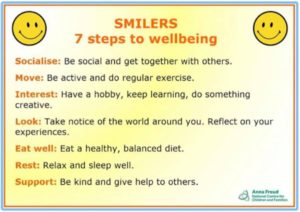
At our recent parent-teacher consultations, a few parents asked about the sound mats we use in school. Children have been talking about ‘orange’ and ‘green’ sounds at home – which is great!
Here are the sound mats and below is a link demonstrating how each phoneme (sound) is pronounced.

Listen to the orange sounds here.
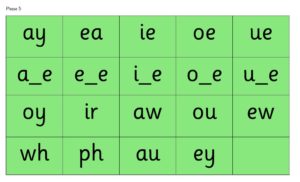
Here is your home learning for this week with a welcome video from Mrs Latham.
Maths
This week’s maths learning is addition and part whole models.
Year 1
You don’t have to print the worksheets. Your child can write or draw their answers on paper. Your child’s learning will be most effective if you sit with them to pause the clip and check / praise / support your child as the clip moves on.
(Suggested time: 30 minutes of Maths and 15 minutes of Rockstars daily)
Spelling
Look on the homework page to find this week’s spellings. Your child should complete one task each day.
(Suggested time: 15-20 minutes daily)
Reading fluency
This is the text we’re using in class this week to build up fluency skills.
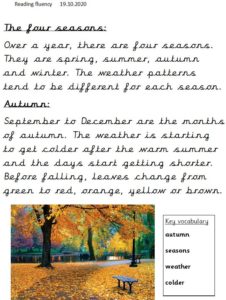
In school, we generally follow this sequence:
(Suggested time: 15 minutes daily)
Reading comprehension and phonics
Day 1: We’ll be using this ‘RIC’ text in class to practise comprehension skills. RIC stands for:
Day 2: Agree with your child three words from any text they’ve read which they’re less familiar with. Your child should find out what they mean (eg by checking an online dictionary or simply discuss with you) and how to use them in sentences (both when speaking and when writing). Challenge your child to write a sentence with each word in, or to drop the words into conversations at home.
Day 3: These video lessons for from BBC Bitesize links to the phonics sounds for ‘oi’, ‘ear’, ‘air‘, ‘er‘ and ‘ure’. Watch the video and complete the activities.
Day 4: Go on a sound hunt around your house and find as many things as you can that contain the phonics sounds ‘oi’, ‘ear’, ‘air’, ‘er’ and ‘ure’. Write a list of all the things you find. Challenge : Write sentences containing some of the words.
Day 5: Book Club. Once a week, we have a relaxing lesson where we sit and read quietly, often with an adult. You can read the books you take home from school or some of your own books.
(Suggested time: 30 minutes daily)
Writing
Activity 1:
Year 1 children: Talk to your child about a picture or photograph you choose. Write three words or phrases to label different things in the picture (eg ‘a car’ or ‘a red car’). Your child should aim to spell in a sensible way and use finger spaces between the words, joining up letters if they can (use our handwriting guide to help).
Activity 2:
Finger strengthening activities support the development of fine motor skills needed for writing.
Challenge your child to have a go at 3 or more of these activities: practise tying shoe laces, fasten and unfasten buttons, attach nuts and bolts, separate dried pasta and dried peas (or similar) into two separate piles, do some mindfulness colouring in, do a jigsaw, cut up drinking straws and thread them on to a shoe lace, attach clothes pegs (the squeezable type) to a shoe box or similar, use a paint brush and water to make pictures or words on a wall, chalk words or pictures on the ground, make a Lego model.
(Suggested time: 30 minutes daily)
Topic
Our current topic work is History – learning about the Great Fire of London. This week we are thinking about fire safety. Have a look at this poster and talk about what you need to do to stay safe if you encounter a fire.
(Suggested time: 30 minutes)
Science
Our science work this half term has been about ‘living things and their habitats’. Look at our vocabulary and talk (or write) about what you remember about each word.

(Suggested time: 30-45 minutes)
Here is your home learning for this week with a welcome video from Mrs Latham.
Maths
This week’s maths learning is all about number bonds.
Year 2
You don’t have to print the worksheets. Your child can write or draw their answers on paper. Your child’s learning will be most effective if you sit with them to pause the clip and check / praise / support your child as the clip moves on.
(Suggested time: 30 minutes of Maths and 15 minutes of Rockstars daily)
Spelling
Look on the homework page to find this week’s spellings. Your child should complete one task each day.
(Suggested time: 15-20 minutes daily)
Reading fluency
This is the text we’re using in class this week to build up fluency skills.

In school, we generally follow this sequence:
(Suggested time: 15 minutes daily)
Reading comprehension and phonics
Day 1: We’ll be using this ‘RIC’ text in class to practise comprehension skills. RIC stands for:
Day 2: Agree with your child three words from any text they’ve read which they’re less familiar with. Your child should find out what they mean (eg by checking an online dictionary or simply discuss with you) and how to use them in sentences (both when speaking and when writing). Challenge your child to write a sentence with each word in, or to drop the words into conversations at home.
Day 3: These video lessons for from BBC Bitesize links to the phonics sounds for ‘oi’, ‘ear’, ‘air‘, ‘er‘ and ‘ure’. Watch the video and complete the activities.
Day 4: Go on a sound hunt around your house and find as many things as you can that contain the phonics sounds ‘oi’, ‘ear’, ‘air’, ‘er’ and ‘ure’. Write a list of all the things you find. Challenge : Write sentences containing some of the words.
Day 5: Book Club. Once a week, we have a relaxing lesson where we sit and read quietly, often with an adult. You can read the books you take home from school or some of your own books.
(Suggested time: 30 minutes daily)
Writing
Activity 1:
Year 2 children: Write three sentences about a picture or photograph you choose. Your child should remember capital letters, finger spaces, joining up letters if they can (use our handwriting guide to help), and a full stop, exclamation mark (!) or question mark (?) to end the sentence.
Activity 2:
Finger strengthening activities support the development of fine motor skills needed for writing.
Challenge your child to have a go at 3 or more of these activities: practise tying shoe laces, fasten and unfasten buttons, attach nuts and bolts, separate dried pasta and dried peas (or similar) into two separate piles, do some mindfulness colouring in, do a jigsaw, cut up drinking straws and thread them on to a shoe lace, attach clothes pegs (the squeezable type) to a shoe box or similar, use a paint brush and water to make pictures or words on a wall, chalk words or pictures on the ground, make a Lego model.
(Suggested time: 30 minutes daily)
Topic
Our current topic work is History – learning about the Great Fire of London. This week we are thinking about fire safety. Have a look at this poster and talk about what you need to do to stay safe if you encounter a fire.
(Suggested time: 30 minutes)
Science
Our science work this half term has been about ‘living things and their habitats’. Look at our vocabulary and talk (or write) about what you remember about each word.

(Suggested time: 30-45 minutes)
It has been a very busy week. We have settled into our routines well and our learning is zooming along!
For great learning…
George – for great learning in reading. You are becoming a super fluent reader.
For sport and physical activity…
Oliver – for great resilience when skipping using the big rope. You smashed your personal best this week!
For living and learning…
Ava A– for being an active learner. You share your ideas with the class happily.